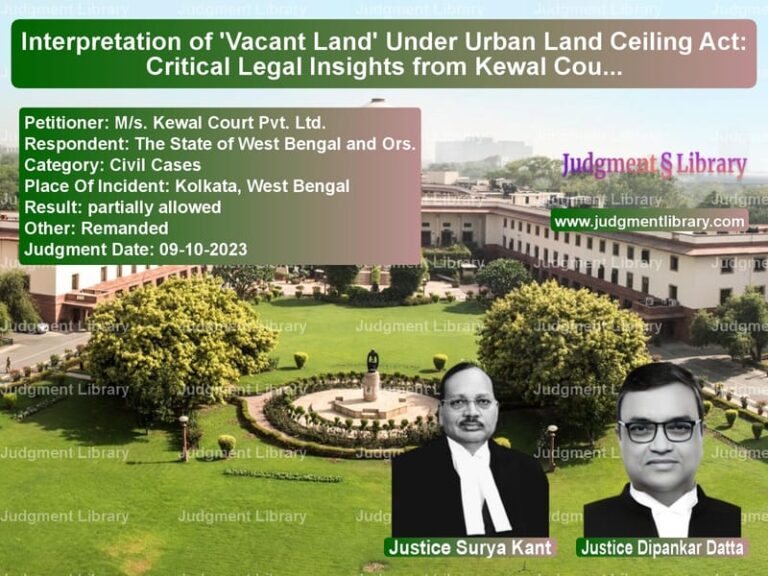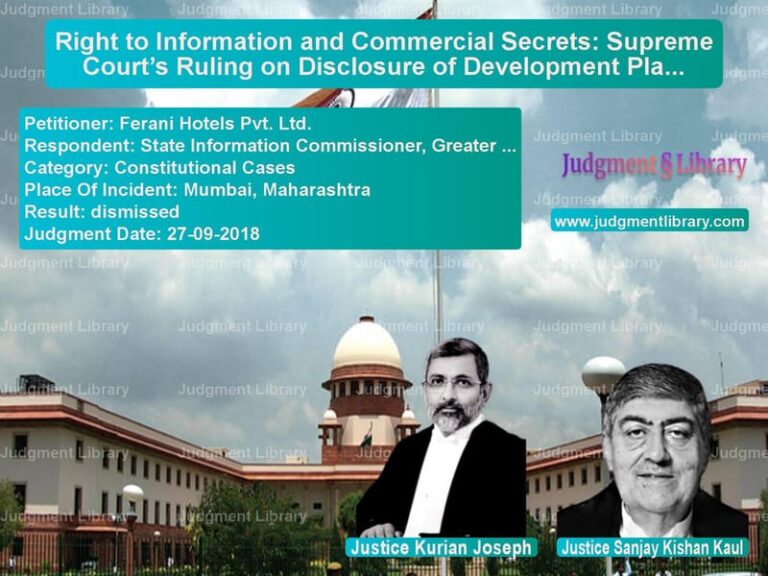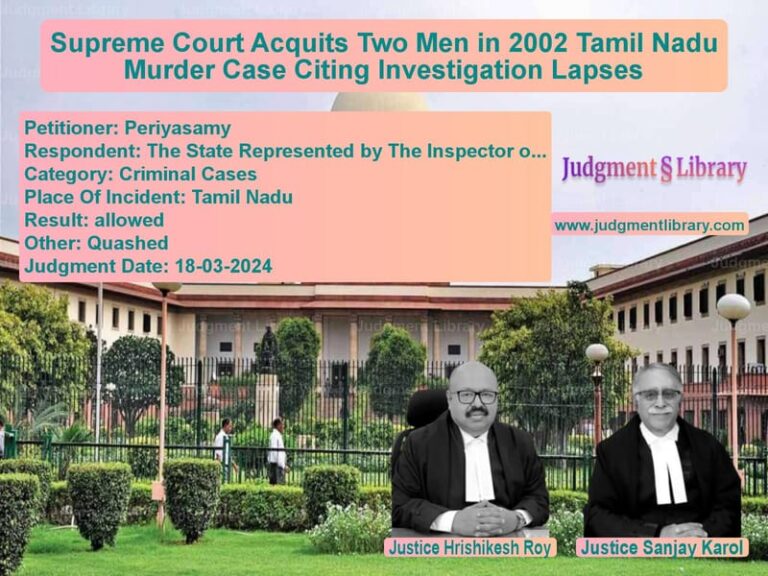Supreme Court Clarifies Deduction of Compassionate Assistance in Motor Accident Claims
The Supreme Court of India recently delivered a significant judgment addressing the interplay between compensation awarded under the Motor Vehicles Act, 1988, and the Haryana Compassionate Assistance to the Dependents of Deceased Government Employees Rules, 2006. The case, titled New India Assurance Co. Ltd. v. Smt. Sunita Sharma and Ors., revolved around whether the compensation received under the Rules of 2006 should be fully deducted from the compensation awarded under the Motor Vehicles Act.
Background of the Case
The appeal arose from a Special Leave Petition filed by New India Assurance Co. Ltd., challenging the decision of the High Court, which had deducted only 50% of the compensation payable under the Rules of 2006 from the amounts awarded under the Motor Vehicles Act. The High Court had relied on its earlier judgment in Kamla Devi v. Sahib Singh & Ors., despite the Supreme Court’s clear ruling in Reliance General Insurance Co. Ltd. v. Shashi Sharma.
Key Arguments
Arguments by the Petitioner (New India Assurance Co. Ltd.)
- The petitioner argued that the High Court erred in deducting only 50% of the compensation under the Rules of 2006, contrary to the Supreme Court’s decision in Shashi Sharma, which mandated full deduction of the amount received under the Rules of 2006 towards the head of “pay and other allowances.”
- The petitioner also relied on the subsequent decision in National Insurance Company Limited v. Birender and Others, which reinforced the principle that compensation under the Rules of 2006 should be deducted from the award under the Motor Vehicles Act.
- The petitioner undertook that no recovery would be claimed from the respondents if the amounts had already been paid.
Arguments by the Respondents (Smt. Sunita Sharma and Others)
- No representation was made on behalf of the respondents, as they did not appear despite service of notice.
Supreme Court’s Analysis
The Supreme Court, in its judgment authored by Justice K. Vinod Chandran and Justice Sudhanshu Dhulia, meticulously analyzed the legal principles governing the deduction of compassionate assistance from motor accident compensation. The Court emphasized the following key points:
1. Precedents on Deduction of Compensation
The Court referred to its earlier decision in Shashi Sharma, where a three-judge Bench had held:
“The Claims Tribunal has to adjudicate the claim and determine the amount of compensation which appears to it to be just. The amount receivable by the dependents/claimants towards the head of pay and allowances in the form of ex-gratia financial assistance, therefore, cannot be paid for the second time to the claimants… The harmonious approach for determining a just compensation payable under the Act of 1988, therefore, is to exclude the amount received or receivable by the dependents of the deceased Government employee under the Rules of 2006 towards the head financial assistance equivalent to ‘pay and other allowances’ that was last drawn by the deceased Government employee in the normal course.”
The Court also cited Birender, where it had clarified that the compensation awarded under the Motor Vehicles Act should be subject to the amount received under the Rules of 2006, and any such amount should be deducted from the compensation.
2. High Court’s Error
The Supreme Court expressed surprise that the High Court had ignored its binding precedent in Shashi Sharma and instead followed its own contrary judgment in Kamla Devi. The Court reiterated that such disregard for its rulings violates Article 141 of the Constitution, which mandates that the law declared by the Supreme Court is binding on all courts in India.
3. Clarification on Deduction
The Court clarified that while the amount received under the Rules of 2006 towards “pay and other allowances” must be deducted from the compensation under the Motor Vehicles Act, other benefits such as family pension, life insurance, and provident fund should remain unaffected. This distinction ensures that claimants are not unjustly enriched by receiving double compensation for the same loss.
Court’s Decision
The Supreme Court allowed the appeal and set aside the impugned judgment of the High Court to the extent it deducted only 50% of the compensation payable under the Rules of 2006. The Court held:
- The compensation awarded under the Motor Vehicles Act must be adjusted by deducting the full amount received or receivable under the Rules of 2006 towards “pay and other allowances.”
- No recovery shall be made from the respondents if the amounts have already been paid.
- The High Court’s failure to follow the Supreme Court’s binding precedent was a violation of Article 141 of the Constitution.
Conclusion
The judgment reaffirms the principle that compensation awarded under compassionate assistance schemes should not result in double payment for the same loss. By clarifying the scope of deductions, the Supreme Court has ensured a harmonious interpretation of the Motor Vehicles Act and the Rules of 2006, while safeguarding the interests of claimants and insurance companies alike.
Petitioner Name: New India Assurance Co. Ltd..Respondent Name: Smt. Sunita Sharma and Others.Judgment By: Justice K. Vinod Chandran, Justice Sudhanshu Dhulia.Place Of Incident: Haryana.Judgment Date: 08-04-2025.Result: allowed.
Don’t miss out on the full details! Download the complete judgment in PDF format below and gain valuable insights instantly!
Download Judgment: new-india-assurance-vs-smt.-sunita-sharma-a-supreme-court-of-india-judgment-dated-08-04-2025.pdf
Directly Download Judgment: Directly download this Judgment
See all petitions in Motor Insurance Settlements
See all petitions in Compensation Disputes
See all petitions in Insurance Settlements
See all petitions in Third-Party Insurance
See all petitions in Judgment by K. Vinod Chandran
See all petitions in Judgment by Sudhanshu Dhulia
See all petitions in allowed
See all petitions in supreme court of India judgments April 2025
See all petitions in 2025 judgments
See all posts in Insurance Cases Category
See all allowed petitions in Insurance Cases Category
See all Dismissed petitions in Insurance Cases Category
See all partially allowed petitions in Insurance Cases Category







